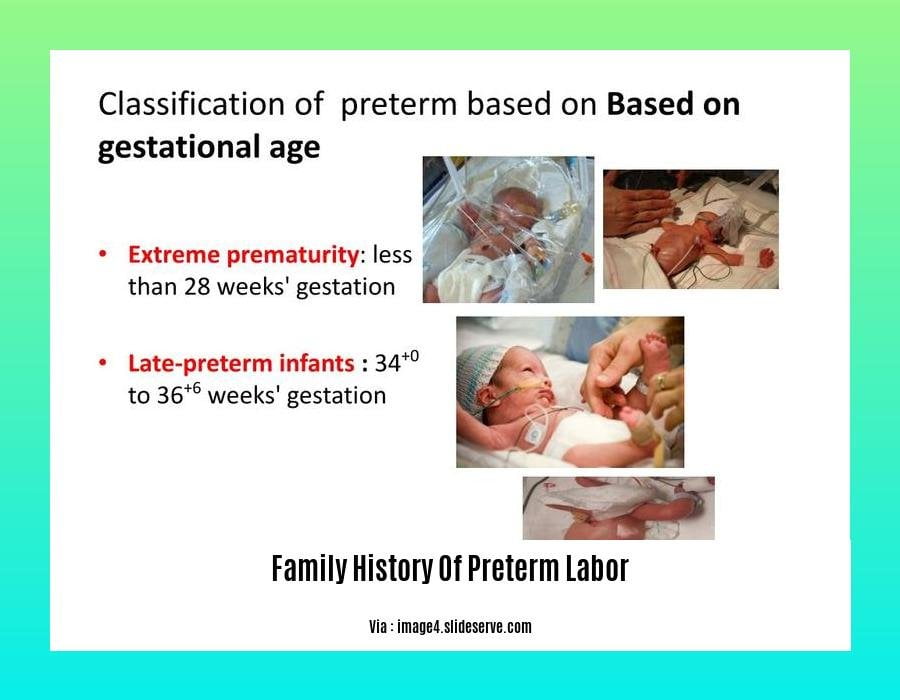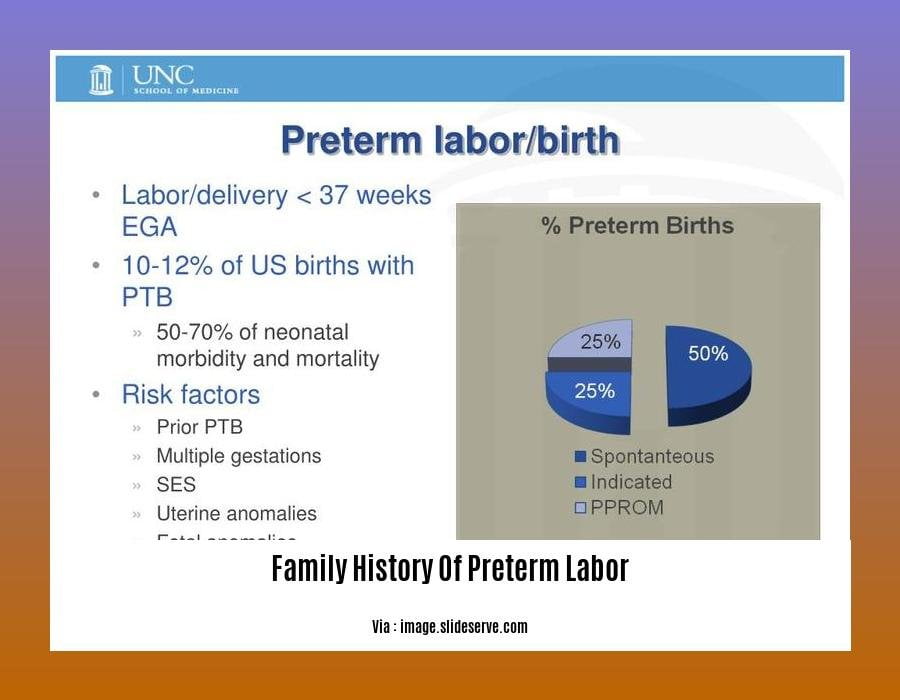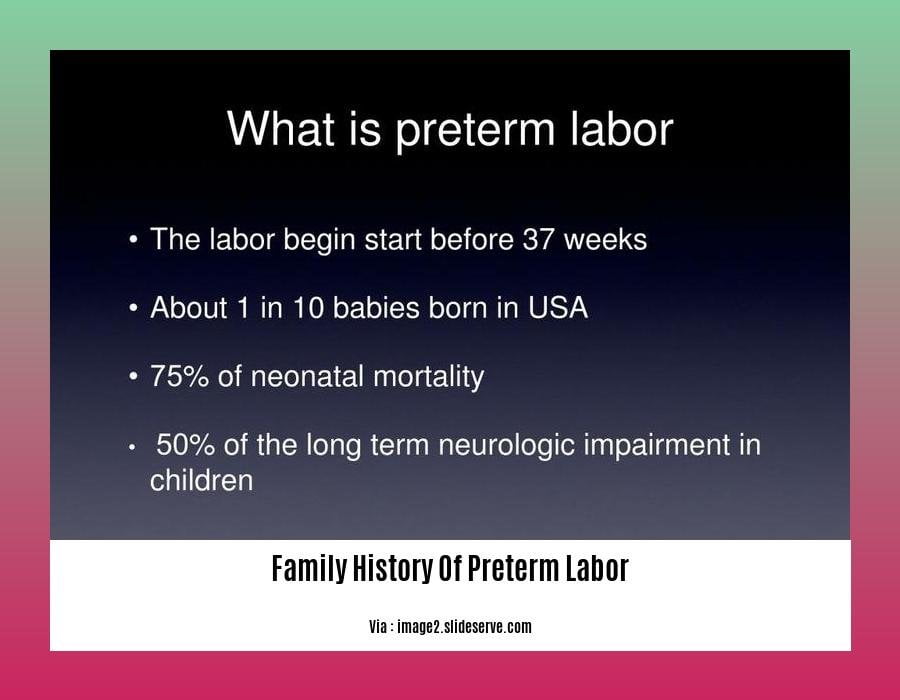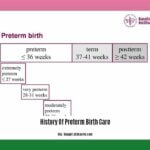The risk of premature birth, also known as preterm labor, is elevated among individuals with a family history of this complication during pregnancy. This article, “Family History of Preterm Labor: Understanding the Risk and Implications,” explores the influence of family history on preterm labor, highlighting the significance of genetic factors.
Key Takeaways:
- Family history of preterm labor is a significant risk factor for having a premature baby.
- Other risk factors include previous preterm birth, a short cervix early in pregnancy, and certain medical conditions or surgeries.
- Pregnancy with twins or other multiples also increases the risk.
- Understanding these risk factors can help women and healthcare professionals make informed decisions to reduce the chances of preterm labor.
Family History Of Preterm Labor

Family History Of Preterm Labor
A family history of preterm birth is a significant risk factor for having a premature baby. If you have a first-degree relative (mother, sister, or daughter) who has had a preterm birth, you are at an increased risk of having one yourself. The risk is even higher if you have multiple first-degree relatives who have had preterm births.
How Does Family History Increase the Risk of Preterm Labor?
The exact reason why family history increases the risk of preterm labor is not fully understood. However, there are several possible explanations:
- Genetic Factors: There may be genetic factors that are passed down from parents to children that increase the risk of preterm labor. These factors may affect the way the cervix responds to hormones, the strength of the uterine muscles, or the overall health of the pregnancy.
- Environmental Factors: Families who have a history of preterm birth may share similar environmental factors that contribute to the risk, such as socioeconomic status, access to healthcare, or lifestyle choices.
- Shared Lifestyle Factors: Families who have a history of preterm birth may share similar lifestyle factors that contribute to the risk, such as smoking, substance use, or poor nutrition.
What Can You Do if You Have a Family History of Preterm Labor?
If you have a family history of preterm labor, there are several things you can do to reduce your risk:
- Get regular prenatal care: Prenatal care can help identify and manage risk factors for preterm labor, such as infections, high blood pressure, and cervical shortening.
- Follow your doctor’s orders: Your doctor may recommend lifestyle changes, such as quitting smoking, eating a healthy diet, and exercising regularly. They may also recommend taking certain medications to help prevent preterm labor.
- Be aware of the signs and symptoms of preterm labor: If you experience any symptoms of preterm labor, such as contractions, vaginal bleeding, or pelvic pressure, call your doctor immediately.
- Consider genetic counseling: If you have a strong family history of preterm birth, you may want to consider genetic counseling. A genetic counselor can help you understand your risk factors and make informed decisions about your pregnancy.
For comprehensive insights on the evolution of care for premature infants, explore our detailed article on the history of preterm birth care. Discover the milestones and advancements that have shaped the field of History Of Preterm Birth. Learn about the causes, risks, and consequences of premature delivery, particularly for those who are History Of Preterm Delivery Currently Pregnant. Gain valuable information about the signs and symptoms of History Of Preterm Labor to ensure timely intervention and optimal outcomes.
Role of lifestyle factors in premature delivery

A family history of preterm birth certainly raises the risk of preterm delivery for the individual, but there’s more to the story. Lifestyle factors also play a significant role in influencing the likelihood of preterm birth.
Smoking is a major player. It’s linked to several pregnancy complications, including preterm labor. Smoking damages the placenta, the lifeline between mom and baby, and limits the baby’s oxygen supply.
Alcohol and drug use can also increase the risk of preterm birth. These substances can harm the baby’s development and lead to health problems, including premature birth.
Poor nutrition is another culprit. A healthy diet is essential for both mom and baby. Getting enough folic acid, iron, and other nutrients helps prevent birth defects, low birth weight, and preterm birth.
Stress can take a toll on pregnancy too. Chronic stress can lead to high blood pressure, which can increase the risk of preterm birth. Finding healthy ways to manage stress, like exercise, yoga, or meditation, can help.
Obesity increases the risk of preterm birth. Excess weight can lead to pregnancy complications like gestational diabetes and high blood pressure, which can contribute to preterm labor.
Adequate prenatal care is crucial in reducing the risk of preterm birth. Regular checkups allow healthcare providers to monitor for risk factors and provide support and guidance.
Key Takeaways:
- Family history significantly increases the risk of preterm delivery.
- Lifestyle factors, such as smoking, substance use, poor nutrition, stress, and obesity, contribute to the risk of preterm birth.
- Quitting smoking, avoiding drugs and alcohol, maintaining a healthy diet, managing stress, achieving a healthy weight, and receiving adequate prenatal care can help reduce the risk of preterm birth.
Relevant URL Sources:
* The role of lifestyle factors in preterm delivery
* Lifestyle factors and risk of preterm birth
Importance of prenatal care for women with a family history of preterm labor
If your mother or sister has given birth prematurely, you may be wondering about your own risk of having a preterm baby. While a family history of preterm labor doesn’t guarantee that you’ll experience the same, it does increase your risk. That’s why it’s crucial to be aware of the importance of prenatal care if you have a family history of preterm labor.
Key Takeaways:
- A family history of preterm birth increases your risk of preterm birth.
- Prenatal care can help identify and manage risk factors for preterm birth.
- It’s essential to follow your doctor’s orders and attend all prenatal appointments.
- Be aware of the signs and symptoms of preterm labor and contact your doctor immediately if you experience any.
Prenatal care is essential for all pregnant women, but it’s crucial for those with a family history of preterm labor. Regular prenatal visits allow your doctor to monitor your pregnancy and identify any potential risk factors. Your doctor can also provide you with information and support to help you reduce your risk of preterm labor.
Here are some things you can do to reduce your risk of preterm labor if you have a family history:
- Start prenatal care as soon as possible.
- Attend all of your prenatal appointments.
- Follow your doctor’s orders regarding lifestyle modifications and medications.
- Be aware of the signs and symptoms of preterm labor and contact your doctor immediately if you experience any.
By following these tips, you can help reduce your risk of preterm labor and give your baby the best possible start in life.
Citations:
- The role of family history of preterm delivery in the individual risk of preterm delivery
- Family history is a predictor of current preterm birth
Strategies for reducing preterm births in families with a history of the condition
If you have a family history of preterm birth, you may be at an increased risk of having a preterm baby yourself. This is because certain factors, such as genetics and lifestyle choices, can contribute to preterm labor. However, there are steps you can take to reduce your risk.
Identify your risk factors
The first step in reducing your risk of preterm birth is to identify your risk factors. Some of the most common risk factors include:
- Having a previous preterm birth
- Being pregnant with multiples
- Having a short cervix
- Having a uterine abnormality
- Having a history of cervical surgery
- Being exposed to certain environmental toxins
- Smoking
- Using alcohol or drugs
- Being underweight or overweight
- Having certain medical conditions, such as diabetes or high blood pressure
Make healthy lifestyle choices
Once you know your risk factors, you can start making healthy lifestyle choices to reduce your risk of preterm birth. Some of the most important things you can do include:
- Getting regular prenatal care
- Eating a healthy diet
- Exercising regularly
- Maintaining a healthy weight
- Quitting smoking
- Limiting alcohol intake
- Avoiding exposure to certain environmental toxins
- Managing stress
Follow your doctor’s orders
Your doctor will be able to provide you with specific instructions on how to reduce your risk of preterm birth. Be sure to follow their orders carefully. They may recommend that you take certain medications, such as progesterone supplements, or have a cervical cerclage.
Be aware of the signs and symptoms of preterm labor
It’s important to be aware of the signs and symptoms of preterm labor. These include:
- Contractions that are regular and getting closer together
- Pelvic pressure or a feeling that your baby is pushing down
- Lower back pain
- Abdominal cramps
- Vaginal bleeding or spotting
- Watery discharge from your vagina
If you experience any of these symptoms, call your doctor immediately.
Key Takeaways:
- Family history is a significant risk factor for preterm birth.
- Identifying and managing risk factors is crucial for reducing the risk of preterm birth.
- Lifestyle modifications, regular prenatal care, and following doctor’s orders are essential.
- Be aware of the signs and symptoms of preterm labor and seek medical attention promptly.
References:
Next generation strategies for preventing preterm birth
Reducing the risk of preterm birth: Evidence and implications
















